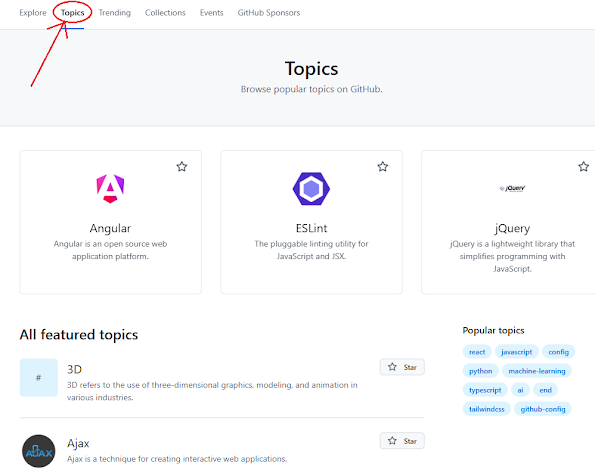Adv Python HKPU 2025 (Under Construction)
Advanced Python
L1: 29 Mar 2025
Github: https://github.com/1eo1ui/2025-advanced-python
Github tutorial beginning video: https://youtu.be/iv8rSLsi1xo?si=a9oKgYuUxFDh-YNe
Github =
Data analyst / Programmer's cloud drive + their hub of Social media (like Facebook, Instagram)
Github basics (): https://youtu.be/FopO8IQLX_E?si=8BEq6-PF4acPHAbS
- Free open-source apps & tools + with the top-world-class resources:
- Learn English
- Exam questions & solutions
- Programming
- e-Books
- PPT templates / examples
- Weekly / monthly magazine
1) Github interesting projects - Hello Github: https://hellogithub.com/en
2) Github Searching: a) search without an objective / a specific purpose; b) search to solve a problem
a) search without an objective / a specific purpose: Github search --> Like a news page, Your clicking "Star" will tell your interest to the Github's AI engine, so that he can recommend some projects that may attract you!! Github > Home - it is a Dashboard ==> "Explore"
- Explore > Topics
- e.g. Chrome Extension > Chrome Extension of Video dwonload:
Download Github Desktop at: desktop.github.com
Learn Github: w3schools Github tutorial
- YouTube: 我每天都用的AI工具,幫我節省幾十萬一年!【一人公司必學】(Cantonese, by AI Bunny)
- YouTube: 股價預測AI實作,Python程式碼逐行解說,實測結果大公開 (Cantonese, by 解密遊俠)
- AI有沒有可能跟據過往的股價紀錄,預測明天的股價呢?就算做不到很精準,只要預測到大致的走向,也足以用來操作賺錢了。如果我真的做到這個AI,豈不發大財?我立刻參考一些網上廣傳的範例,並根據自己的AI開發經驗做了些改良,最後得出更神準的AI!那麼,這個AI是否真的能用來賺錢呢?我將會大方地告訴大家確切的答案!我會毫無保留地展示這個AI的所有程式碼,和指出網上那些範例忽略了的重點!
- 本片內容包括:
- 0. 環境準備:Python、Jupyter Notebook、TensorFlow、Docker image 1. AI的功能設計(AI functional design) 2. 數據採集的方法(data collection):Yahoo Finance、Pandas、數據視覺化(data visualization)、日K、Scikit-Learn、MinMaxScaler、Numpy 3. AI模型的設計(AI modeling):Keras、LSTM(Long Short-Term Memory)、循環神經網絡(recurrent neural network)、optimizer、Adam、loss function、mean squared error 4. 訓練AI的方法(AI training strategy):訓練集(training set)、驗證集(validation set)、測試集(test set)、過度擬合(over-fit)、Early Stopping、epochs 5. 實測的結果(model evaluation):前進式回測(forward test) 6. 實用性的評價(practicality evaluation):CvRMSE(Coefficient of Variation of the Root Mean Squared Error)
- 這條影片係教你用 Python + Jupyter Notebook + LSTM 去預測股票價格,步驟都好清晰,以下係重點流程同簡化版 notebook 範例:
- 主要步驟:
- 1. 安裝環境:Python、Jupyter Notebook、TensorFlow、Pandas、Scikit-Learn。
- 2. 數據採集:用 Yahoo Finance 下載股票歷史數據(例如匯豐控股 0005.HK),只用收市價。
- 3. 數據處理:用 MinMaxScaler 標準化數據,製作 60 天收市價預測第 61 天收市價的訓練集和測試集。
- 4. 建立模型:用 Keras 建立兩層 LSTM + 兩層 Dense 的神經網絡。
- 5. 訓練模型:用 Early Stopping 防止 overfit,分 training/validation/test set。
- 6. 預測及評估:將預測結果還原回原始價格,與實際股價比較。
- 簡化 Jupyter Notebook 範例:
pythonimport yfinance as yfimport pandas as pdimport numpy as npfrom sklearn.preprocessing import MinMaxScalerfrom tensorflow.keras.models import Sequentialfrom tensorflow.keras.layers import LSTM, Densefrom tensorflow.keras.callbacks import EarlyStoppingimport matplotlib.pyplot as plt# 下載數據df = yf.download('0005.HK', period='10y')data = df[['Close']].rename(columns={'Close':'GT'})# 標準化scaler = MinMaxScaler()scaled = scaler.fit_transform(data)# 製作訓練資料x, y = [], []for i in range(60, len(scaled)):x.append(scaled[i-60:i])y.append(scaled[i])x, y = np.array(x), np.array(y)# 分割訓練/測試集split = int(0.8 * len(x))x_train, x_test = x[:split], x[split:]y_train, y_test = y[:split], y[split:]# 建立模型model = Sequential([LSTM(50, return_sequences=True, input_shape=(60,1)),LSTM(50),Dense(25),Dense(1)])model.compile(optimizer='adam', loss='mse')# 訓練es = EarlyStopping(patience=10, restore_best_weights=True)model.fit(x_train, y_train, epochs=1000, validation_split=0.2, callbacks=[es])# 預測pred = model.predict(x_test)pred = scaler.inverse_transform(pred)y_test_inv = scaler.inverse_transform(y_test)# 畫圖plt.plot(y_test_inv, label='GT')plt.plot(pred, label='Prediction')plt.legend()plt.show()
- 重點提醒:
- 影片最後都有講,這種 AI 其實多數只係預測「明天等於今日」,真正賺錢未必得,但學習 AI 實作就好有用!
- YouTube: Python 小程式連接富途牛牛 l 免費下載1分鍾股票數據 l 不懂編程都可以 l 不用課金 l (by Dennis, )
- 呢條片教你點樣用Python連接富途牛牛API嚟下載1分鐘嘅股票歷史數據,完全免費,唔使靠Yahoo或Google嘅日線數據,亦唔使買IB數據。主要步驟係:
- 1. 下載安裝FutuOpenD:去富途官網下載FutuOpenD,安裝後用富途牛牛帳號登入
- 2. 安裝Python:最好下載Anaconda,因為佢已經包含Python同好多函式庫,省卻好多麻煩
- 3. 安裝PyCharm:去官網下載PyCharm Community免費版,用嚟編寫Python程式
- 4. 安裝FutuAPI:開Anaconda Prompt,輸入 pip install futu-api 指令安裝
- 5. 用Python寫程式連接富途API,就可以下載股票歷史數據,再匯入Multicharts做分析同回測
- Dennis話呢個方法唔單止可以下載數據,理論上仲可以連接Multicharts做自動交易,不過過程比較複雜同唔太穩定,所以呢條片主要集中教下載數據嘅部分。
- 你有冇富途牛牛帳戶?想試下呢個方法下載邊隻股票嘅數據?
- YouTub: AI做的PPT用不起來?你錯過了這10個獨家技巧,實測效果提升200%|AI幫我10分鐘搞定PPT,全流程教程分享|職場/學生/學術研究|AiPPT.com












留言
張貼留言